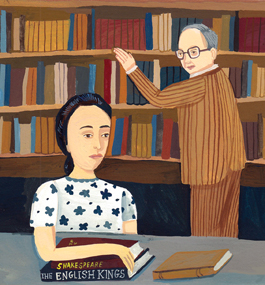Turning Points
Only a Girl

Giselle Potter
by Merrill Joan Gerber, MA’81
I arrived at Brandeis on a graduate scholarship in fall 1959 from the University of Florida. At my first class meeting, I was asked to name some important British literary critics. I knew none. I had no clue about this world of academia and no ambition to be a star in its firmament.
By the middle of the year, however, I had studied with Philip Rahv, with Irving Howe, with J.V. Cunningham, with Milton Hindus. I had published my first story in Mademoiselle. I was with my high-school sweetheart, Joe Spiro, who was in the History of Ideas program. I had always wanted to be a writer, and I was working every day toward that goal. Being at Brandeis had enlarged my world a thousandfold.
It seemed to me a good idea to go on for a PhD. I had already begun to study for the master’s oral exam. The list of subjects was daunting. I was required to know all the works of Shakespeare, all the English kings in order, much of the literature of the centuries. I had written my two master’s papers, on Emily Dickinson and D.H. Lawrence, and gotten A’s.
So I applied for a PhD scholarship in English for the following year. Some days later, Irving Howe called me into his office. He said to me in 1960 what could never be said now. He said (the words were burned into my mind for life), “Merrill, you’re only a girl, and you’re only a writer. Your grades are as good as any man’s, but men need these scholarships more than you do.”
He turned his back to me and began to arrange some books in a bookshelf behind his desk.
I went to my room in Schwartz Hall, where I cried. I had thought Irving Howe, my teacher, a lover of literature, would appreciate that I wanted to be a writer. He was a lover of Jewish literature. I was writing Jewish literature! My story published in Mademoiselle, “The Cost Depends On What You Reckon It In,” was set in a nursing home on Ocean Parkway in Brooklyn, where my old Jewish grandmother was taken after she had a stroke.
I realized I would never be able to memorize all the English kings in order. I realized that Irving Howe would be on the committee that conducted the MA oral exam and that he would fail me.
In truth, I didn’t want a PhD. I wanted to write fiction.
Goodbye, Mr. Howe, I thought. You will not get a chance to humiliate me again.
I left Brandeis without my MA; married my sweetheart in summer 1960; got a job the following fall as an editorial assistant at Houghton Mifflin in Boston; had my first baby, a girl, in 1962; and published my first book of short stories, “Stop Here, My Friend,” in 1965, and my first novel, “An Antique Man,” in 1967.
By the time my daughters were off at school, after I had won a Wallace Stegner fiction fellowship to Stanford University, after I had published two short stories in The New Yorker, after Redbook magazine had published 42 of my stories (a record!), I considered again my unearned master’s from Brandeis.
I contacted the graduate school and wondered whether it was too late to get my degree. Milton Hindus spoke in my behalf. The English department no longer required an oral exam for the degree and, because I had completed all other work that was required, offered to allow me to take a proctored exam near my home in California. I wrote a three-hour essay on Virginia Woolf’s “To the Lighthouse.” I was sent my MA degree the following June.
Pasadena City College hired me to teach fiction writing, and later so did the California Institute of Technology, where I have taught for 26 years. I have published 30 books (novels, short stories and memoirs). My novel “The Kingdom of Brooklyn” won the Harold Ribalow Prize from Hadassah Magazine, for the best English-language book on a Jewish theme. Elie Wiesel was one of the judges.
Oh, Mr. Howe, I was following in the footsteps of I.B. Singer! You should have been kinder.
Irving Howe died in May 1993; I received the Ribalow Prize in November 1993.
How proud I was to have my master’s from Brandeis. I am still.
Merrill Joan Gerber has earned many writing honors, among them the Andrew Lytle Fiction Prize and the O. Henry Award. The Los Angeles Times named her book “Anna in the Afterlife” one of the best novels of 2002.
